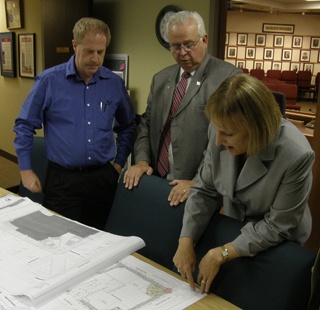A significant downtown redevelopment project inched a critical step forward Tuesday night when the City of Auburn agreed to sell developer Jeff Oliphant and his company land on the dilapidated tavern block.
Oliphant and his firm, Auburn Professional Plaza LLC, plan to replace the block east of City Hall with a three-story brick structure to include a City Hall annex, medical and office space, and a new home for KeyBank.
The total purchase price for both parcels is $1.5 million. Oliphant already owns the third parcel on the row, site of the former Rail Tavern.
City Council members also approved the lease for the area of the building that will become the City Hall annex, which will take up roughly half of the building. The annex is expected to answer the city’s critical need for space outside the cramped, 30-year-old City Hall next door.
The Cavanaugh family owns the present KeyBank building and the parking lot next to it.
“They will be retaining those, and KeyBank will be moving out,” Oliphant said.
Council members, sensitive to the implications of the vacant Cavanaugh lot directly opposite Tavern Block and the defunctProject Ace, an earlier catalyst project, felt they finally had something to smile about.
“What’s significant is that it is really the first step, finally dirt is going to be turned,” said Councilman Gene Cerino. “People will see a major change in downtown Auburn that will be completed. This is a reliable developer that can get this project done. Once the agreement is signed, things will move forward.”
Not so fast.
Oliphant referred to the purchase and sale agreement as “a critical milestone,” but four other contingencies in his agreement with the city must be met before demolition and construction can start. Those contingencies are as follows:
• Finalizing the lease agreement with KeyBank for its future branch on the northeast corner of the building. Oliphant said that lease should be completed within 30 days.
• Completing financial arrangements with KeyBank, which also is the construction lender.
• Obtaining a construction permit from the city. Oliphant said the permit is very close.
There is one last contingency, but it is the big one, and it is causing heartburn – Auburn Regional Medical Center’s proposed three-story parking garage at First and North Division immediately north of City Hall. Because 17 days after its Aug. 20 groundbreaking, 17 days after Mayor Pete Lewis proclaimed, “This is the day we start construction on our new downtown,” nothing has moved on the lot, except that the dirt trucked in for the groundbreaking has moved slightly from east to west, resulting in a more tidy heap.
Calls to the garage contractor, Ensemble Real Estate Services, were not returned for this article.
“The one thing that’s out of our control is that we need to have adequate parking to make our building operate properly, and part of that parking is in the parking structure that is being built by the hospital,” Oliphant said. “Our building cannot open without that parking garage being opened, so we need to know that they are under construction and what their completion date is, and we can work from that date. We should have all our other items completed and ready to go within a very short period of time.”
For this reason, Oliphant said he could not say exactly when the project would start. All he could say is that one year should pass from demolition to construction to tenant improvements and occupation.
Jason Miller, owner of Jason’s Coffee Shop and Fine Baked Goods at 129 A St. NW, just west of the future garage, has watched nothing unfold on the lot during his four years in business. And like doubting Thomas of old, he needs proof that something is actually going to be built there.
“You know, I was a little skeptical when they brought in special dirt for the groundbreaking,” Miller said. “So technically, they didn’t actually break any ground; they brought in their own dirt, which was already broken. And if you want to get really technical about it, the groundbreaking they had was strictly ceremonial in every sense of the word.
“Until I see heavy machinery, or at least some really cool fences that you want to peek through and see what’s going on, I am going to remain skeptical,” Miller added.


